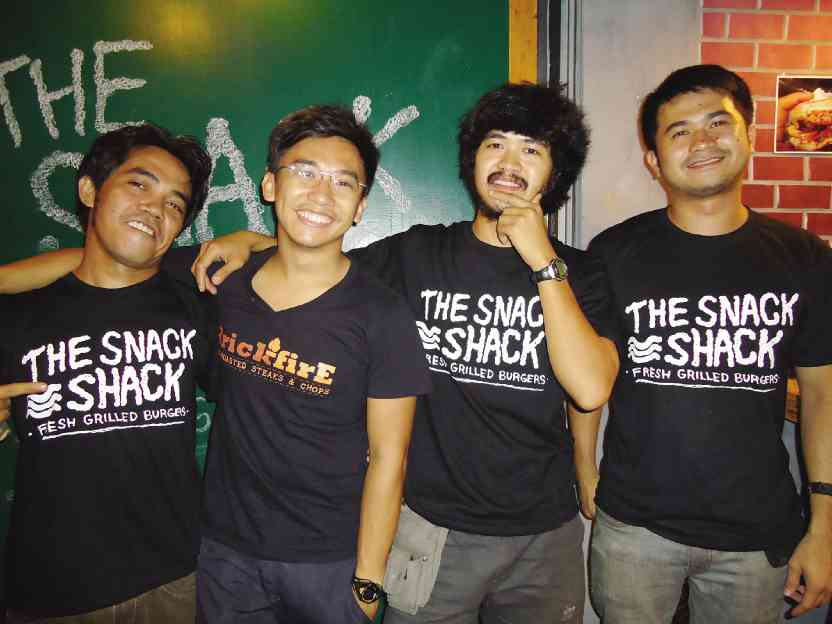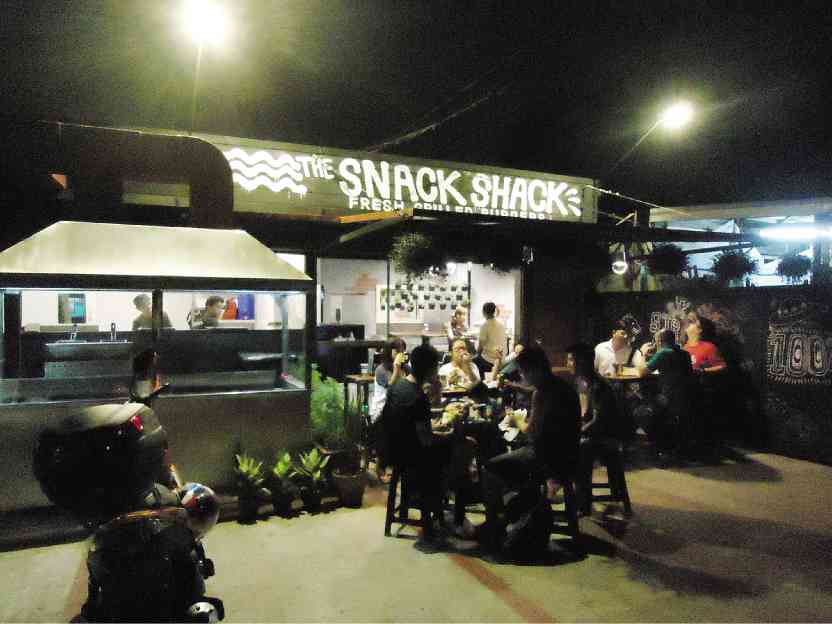University of the Philippines Diliman has cradled many a startup business in its Technology Business Incubation (TBI) facility.
TBI provides small, promising high-tech businesses with low-cost offices and workshops, common facilities, and counselling. At the end of five years, these firms are expected to have weaned away from interventions and begin to slug it out in the “real world.”
Perhaps unknown to UP officialdom, the campus has nursed other small entrepreneurs—not by a stretch of the imagination tech-oriented—albeit informally.

YOUNG entrepreneurs all: Partners Jed Nacabuan (left) and Mity and Tito dela Peña (third and fourth from left) with beef supplier Aaron Macalinao.
These are small businesses that cater to the needs of the student population—in meals, boarding houses, clothing, school supplies, computer, photocopying and other services.
Among these business establishments is Snack Shack, a burger place now drawing hungry crowds in the campus.
Located on Roces Street, near the UP post office, Snack Shack is aptly-named. It is a 3×2 meter non-descript kiosk, with a counter for grilling, and just enough elbow room for two service crew to move about.
On any given day, one will find a queue patiently waiting for orders to be served or packed for takeout. A sign gives customers ample warning: “Fresh grilled burgers.” Implied is that customers should be prepared to wait. The two benches just outside the kiosk are, indeed used more for waiting than for dining.
At P70 and P135 for quarter and half-pounder burgers, prices aren’t really cheap, especially for “iskolars” ng bayan. However, many still consider them “a steal,” because they are, in quality, high-end burgers.
Blogs one customer: “It was worth the wait. The burger was so delicious and juicy. A half pound of pure ground beef, grilled to perfection.”
Miguel de la Peña, twentyish owner of Snack Shack and a UP Fine Arts graduate, confirms the business idea was hatched from the lack of good places to dine within the campus. “Kung meron man, mahal.”
Mity, as Miguel’s friends call him, was four years a graduate when he and some friends brainstormed on a food business to serve the University community.
A shop serving different kinds of sandwiches—delicious, nutritious, affordable—was what they had in mind. As all of them were busy, with Miguel himself working on art commissions, the idea was shelved.
When a year later, a UP resident asked Mity if he was interested to rent the space Snack Shack presently stands on, he didn’t think twice.
Burger should be it, he decided right away. Most people love them and they are easy to prepare.
P50,000 was what it took to start up Snack Shack in 2012. What Mity had saved from his commissions was not enough; his tatay pitched in.
Mity recalls the early days.
“It was a daily struggle for me and my partner, Jed Nacabuan.” They were not entrepreneurs, they had no business training, they sort of just plunged in.
The duo did the marketing everyday on bike, even as before long they were carrying as much as 15 kilos of beef in their backpacks. “I had a car, but no money for gas,” he laughs. The partners prepared the mix of beef and spices, grilled them, served them, manned the cash register.
On their first day, they got ready to sell three kilograms of burger, which was sold out in no time. They gradually increased their stock—7, 13, 15, 20 kg. All were gone before closing hour.
Today the store averages 40 kg of beef daily. What used to be a sole proprietorship is now a corporation, with Mity’s brother Tito joining in. Snack Shack has expanded into two more outlets—in Sikatuna and only last May in Marikina.
Mity and Jed couldn’t believe how readily their market took to Snack Shack.
“It must be our focus on service and quality,” volunteers Mity. “We are not really business-oriented so we tend to be very personal and hands-on in running it.” What they seek to create is a “dining experience focusing on quality of food rather than ambience, where diners feel they’re getting their money’s worth.”
“We are happy with the small profit margin. Our overhead is not high, compared with other shops.”
Mity, who always had a flair for cooking but no formal training in it, developed the recipe. It’s still a work in progress.
Nowadays, with three branches set up, suppliers delivering ingredients to their doorsteps, and 18 employees doing the bulk of grilling and serving, the partners’ responsibilities have evolved. Jed oversees real-time operations, keeping a close watch on stocks and inventory. Tito takes care of legalities like permits which he does edge-wise while teaching fulltime.
Mity handles human resources, including personnel training and trouble-shooting. “I am OC. When I see a small glitz, I fix it right away so it won’t go out of hand. That’s how I apply creativity.” He devised the systems, work stations, controls.
With the recent opening of the Marikina outlet, Snack Shack has begun to operate on a level they have not experienced before. Snack Shack at UP is … well … a shack … makeshift. At Sikatuna, it’s is a hole-in-the-wall.
The Marikina shop is more traditional, with a 50-sqm area and a sitting capacity of 40; and thus presents a different challenge to the partners. Already, Mity is preparing an operations manual to ensure seamless flow of service.
It was off to a good start. General Ordoñez Street in Marikina doesn’t have much foot traffic, so initial sales projections were low. “But we noticed customers keep coming back, bringing new ones.”
Franchising has not crossed the partners’ minds. What they know is that Snack Shack is here to stay, but Mity sees his role changing. “More of supervision and long-term planning.” He wants to go back to art commissions.
(For more entrepreneurial stories, visit the Small Enterprises Research and Development Foundation website at www.serdef.org.)


